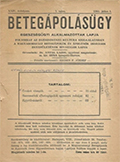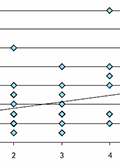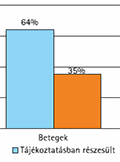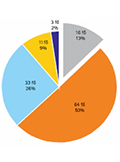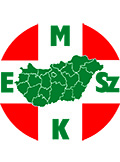The eLitMed.hu medical portal uses computer cookies for convenient operation. Detailed information can be found in the Cookie-policy.
Journal of Nursing Theory and Practice - 2018;31(01)
Content
[Sleep Disorders among ICU Patients]
[Aim: To examine the changes of sleep quality and quantity among patinets in the intensive care unit, to determine the factors which have influence on sleeping and to bare the methods that can help to optimize sleeping. Theme and method: During a quantitative, longitudinal research 82 patients datas and questionnaire answers were analysed. In Microsoft Excel and SPSS 22.0 program we used c2-probe, T-probe, linear regression, Mann-Whitney U probe, descriptive statistics (p<0.05) Results: In comparison of the sleep quality and quantity, both variables changed in negative direction in ICU. The most common factors that influence sleep are: thirst/feeling of mouth dought, uncomfortable posture, therapeutic tools. Correlation is detected between the quality of sleep in ICU and the severity of the existing disease (p=0.004) and therapeutic tools (p=0.002) and noises (p=0.003). Conclusion: In changed environment, mainly in the ICU, the sleep quality and quantity are poor compared to home’s and standard department’s. ]
[The Importance of Teamwork and Patient Education in the Rehabilitation of Stroke Patients]
[The aim of the study: Stroke is an increasing problem in public health. Every year in Hungary tens of thousands of people survive stroke and continue their life bearing all the negative consequences of this disease. Well organized and early rehabilitation treatment, based on the patients’ clinical condition, improves not only their life expectancy, but also quality of life and helps to restore the self- sufficient living as well. The majority of the stroke patients live with numerous of cerebrovascular risk factors, highlighting the special importance of personalized education to prevent the recurrent stroke. Material and Methods: The aim of our investigation was to examine the efficiency of the neuro-rehabilitation teamwork and personalized patient-education among stroke patients took part inpatient rehabilitation of the Teaching Hospital and Rehabilitation Center of Sopron (2016-2017). We measured the change in ability of self- sufficient living with the FIM scale and the Bartel index, while we analyzed the presence of the modifiable cerebrovascular risk-factors with the assistance of a questionnaire was completed by the patient or the relatives (2016-2017). Results: During our research we also evaluated the knowledge of patients about their condition. According to our results the modifiable risk-factors occured cumulatively among our patients and despite the education that stroke patients received during the acute period in the hospital, there still occured a general lack of knowledge regarding their disease. Conclusions: Based on our results the complex rehabilitation therapy started at its earliest possible following the acute period was the most successful method of treatment. During the acute period, the dissemination of written educational materials and information sheets help the recovery phase until the start of the complex rehabilitation therapy. ]
[Factors influencing Lifestyle Changes following Myocardial Infarction . . . . . . . . . . . . . . . . . . . . . . . . . . . . . . . . . . . . . . . . . . . . . . ]
[The aim of the study: In addition, it seeks those methods which might help in keeping the patients motivated so that they participate in regular health education programs, and in calling their attention to the importance of their own responsibility for their health. Material and Methods: Out of the patients who took part in early rehabilitation after a heart attack, a simple random sample of 127 patients was involved (n=127). The survey was conducted by questionnaire and retrospective data analysis. For the analysis, khi2 test, correlation analysis was performed, where p was considered significant if <0.05. Results: 71% of the patients were over the age of 60, 87% were overweight or obese, 39% were smokers at the beginning of the rehabilitation, 85% suffered from hypertension and 39% had diabetes mellitus. As opposed to male patients, females tend to recognise the impact of lifestyle on health (p=0.004). Patients under the age of 60 were more knowledgeable with regards to medicine than patients above the age of 60 (p=0.000). Positive family anamnesis impacts views on lifestyle changes (p=0.01). Conclusion: In order to increase the effectiveness of health education, different methods are needed when teaching patients above the age of 60. Written materials need to supplement verbal information sharing. Patients with positive family anamnesis have already gained some knowledge, which needs to be corrected or extended as required. Nutrition consulting should be made more practical for better feasibility.]
[Nursing Difficulties during the Treatment of Patients from different Cultures]
[Introduction: Inspecting the difficulties of Hungarian nurses during the treatment of patients from different cultures. Materials and methods: Anonymous online questionnaire for the subjective examination of nursing difficulties. Results: The research model consists of 122 responder. Specific questions were answered by applicable 111 responders only. It was discovered that communication is a significant difficulty for 56.76% of the respondents (63 people). Furthermore the patients from different cultures show significant distrust towards the nursing staff. Conclusion: The numbers of lessons in foreign languages need to be increased for Hungarian nurses, researches and presentations are needed in the area of multicultural patient care, communicational instructions and further trainings are required for nurses working in practice.]
1.
Clinical Neuroscience
[Headache registry in Szeged: Experiences regarding to migraine patients]2.
Clinical Neuroscience
[The new target population of stroke awareness campaign: Kindergarten students ]3.
Clinical Neuroscience
Is there any difference in mortality rates of atrial fibrillation detected before or after ischemic stroke?4.
Clinical Neuroscience
Factors influencing the level of stigma in Parkinson’s disease in western Turkey5.
Clinical Neuroscience
[The effects of demographic and clinical factors on the severity of poststroke aphasia]1.
2.
Clinical Oncology
[Pancreatic cancer: ESMO Clinical Practice Guideline for diagnosis, treatment and follow-up]3.
Clinical Oncology
[Pharmacovigilance landscape – Lessons from the past and opportunities for future]4.
5.
